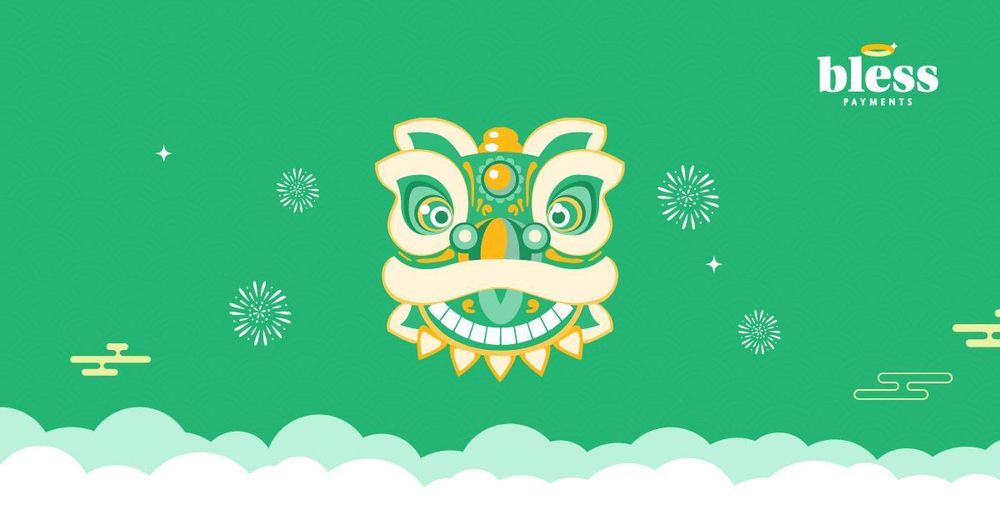
Mo Zaatar
•05 Feb 2024
•7 min read
Send Blessings this Lunar New Year

What is Lunar New Year?
Lunar New Year, also known as Chinese New Year or the Spring Festival, is one of the most important and widely celebrated holidays in many Asian cultures. It marks the beginning of the lunar calendar year, which usually falls between the 21st of January and the 20th of February. While it is most closely associated with Chinese culture, Lunar New Year is also observed in countries like Korea, Thailand, the Philippines, Malaysia, Vietnam, and other East and Southeast Asian nations, each with its unique customs and traditions.
At the heart of Lunar New Year celebrations is the concept of renewal and fresh beginnings. Families gather to honour their ancestors, pay respect to their elders, and seek blessings for the year ahead. Traditional practices include cleaning and decorating homes with red lanterns and banners symbolising good luck and fortune. Red envelopes filled with money, known as "hongbao" in Chinese culture, are given to children and unmarried adults as a token of prosperity.
Food plays a central role in Lunar New Year festivities, with symbolic dishes like dumplings and fish representing abundance and wealth. Each region and culture has its culinary traditions, making the holiday a delightful gastronomic journey.
The highlight of Lunar New Year is the mesmerising dragon and lion dances, vibrant parades, and firework displays that light up the night sky. These performances are believed to ward off evil spirits and bring prosperity to the community.
2024: Enter the Year of the Dragon
In the Chinese zodiac, the dragon is one of the twelve animal signs and is associated with a range of symbolic meanings and characteristics. The dragon is considered one of the most powerful and auspicious signs in Chinese astrology. Below are some of the key symbolisms associated with the dragon in the Chinese zodiac:
- Strength and Power: The dragon is often seen as a symbol of strength, power, and dominance. People born in the Year of the Dragon are believed to possess strong willpower, resilience, and the ability to overcome challenges. They are often seen as natural leaders.
- Good Luck and Fortune: The dragon is associated with good luck, fortune, and prosperity in Chinese culture. It is believed to bring blessings and success, and people born in the Year of the Dragon are often thought to have a fortunate and prosperous life.
- Independence: Dragons are seen as independent and self-reliant. They are often seen as trailblazers who are not afraid to take risks and pursue their goals with determination.
- Creativity and Innovation: The dragon is considered a symbol of creativity, innovation, and visionary thinking. People born in the Year of the Dragon are often seen as imaginative and capable of coming up with new ideas and solutions.
- Protection and Guardianship: In some Chinese traditions, the dragon is also seen as a protective and guardian figure. It is believed to ward off evil spirits and provide a sense of security.
- Nobility and Honor: Dragons are associated with nobility and honour. They are seen as majestic creatures, and people born under this sign are expected to uphold a sense of dignity and honour in their actions.
- Charismatic and Magnetic: Dragons are often considered charismatic and magnetic. They have a natural charm and can easily attract others with their personalities.
It's important to note that the Chinese zodiac operates on a twelve-year cycle, with each year associated with a different animal sign. Therefore, the specific characteristics and qualities of individuals born in the Year of the Dragon can also be influenced by their corresponding elements (Wood, Fire, Earth, Metal, Water) and the interactions between the animal sign and the Chinese calendar's elements.
Overall, the dragon is a symbol of great significance in Chinese culture, and those born under this zodiac sign are believed to possess a range of positive attributes and characteristics.
Why is sending money home special?
Migrants sending money back to their home countries during Lunar New Year, is a significant and heartwarming tradition that reflects the deep bonds between diaspora communities. This practice holds immense cultural and emotional significance for both senders and recipients.
For many migrant families, Lunar New Year is a time of reflection, gratitude, and an opportunity to honour their roots. Sending money back home is a tangible way to express love and support for their families and communities who may still reside in their countries of origin. It can serve as a lifeline for relatives who rely on them for financial assistance, especially during times of economic hardship or unexpected expenses.
The financial contributions made during Lunar New Year also play a vital role in boosting local economies in the migrants' home countries. The influx of funds can stimulate economic growth, support small businesses, and improve the overall quality of life for those living in these communities.
Sending money home during Lunar New Year serves as a bridge connecting generations and cultures. It helps preserve traditions and ensure that cultural practices continue to thrive even among migrant communities far from their homelands.
In essence, sending money overseas during Lunar New Year is a heartwarming testament to the enduring ties between migrants and their countries of origin. It represents not only financial support but also a deep sense of love, cultural preservation, and a shared commitment to family and heritage.
In summary, Lunar New Year is a time for family reunions, cultural expressions, and the anticipation of a fresh start. It embodies the rich tapestry of Asian heritage and traditions, while also symbolising the universal desire for hope, happiness, and prosperity in the year ahead.
1000 views
Recent Posts
See All



